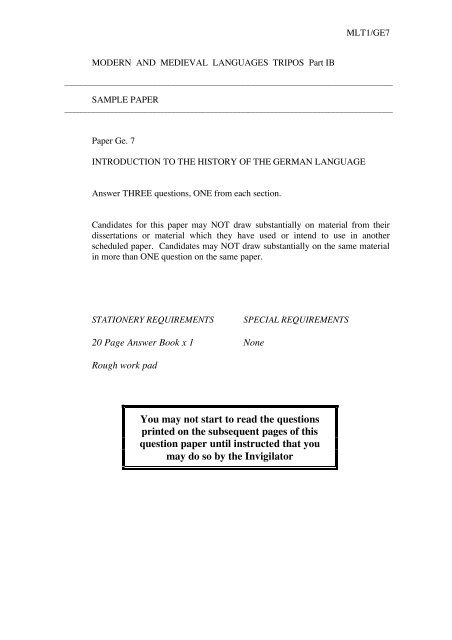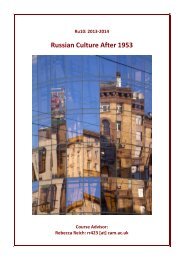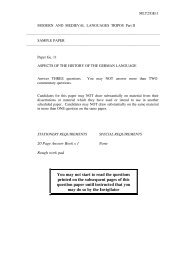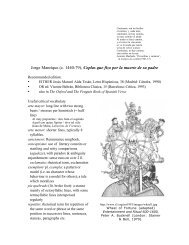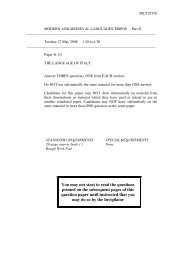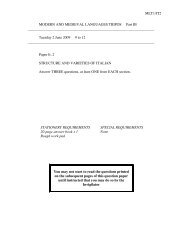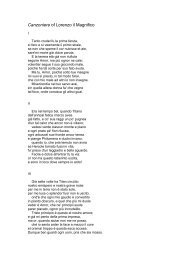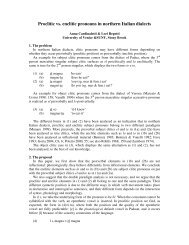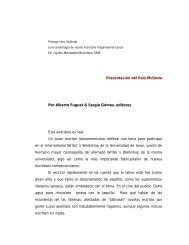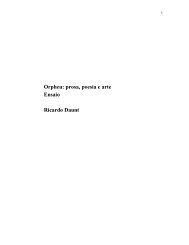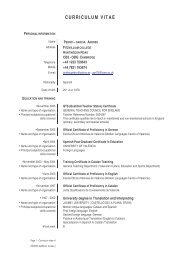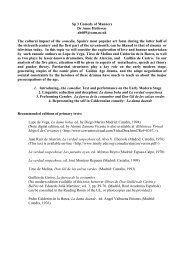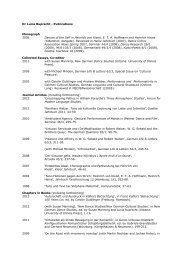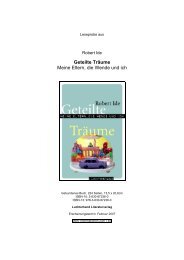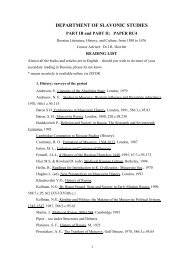You may not start to read the questions printed on the subsequent ...
You may not start to read the questions printed on the subsequent ...
You may not start to read the questions printed on the subsequent ...
Create successful ePaper yourself
Turn your PDF publications into a flip-book with our unique Google optimized e-Paper software.
MODERN AND MEDIEVAL LANGUAGES TRIPOS Part IB<br />
MLT1/GE7<br />
______________________________________________________________________________________<br />
SAMPLE PAPER<br />
______________________________________________________________________________________<br />
Paper Ge. 7<br />
INTRODUCTION TO THE HISTORY OF THE GERMAN LANGUAGE<br />
Answer THREE <str<strong>on</strong>g>questi<strong>on</strong>s</str<strong>on</strong>g>, ONE from each secti<strong>on</strong>.<br />
Candidates for this paper <str<strong>on</strong>g>may</str<strong>on</strong>g> NOT draw substantially <strong>on</strong> material from <str<strong>on</strong>g>the</str<strong>on</strong>g>ir<br />
dissertati<strong>on</strong>s or material which <str<strong>on</strong>g>the</str<strong>on</strong>g>y have used or intend <str<strong>on</strong>g>to</str<strong>on</strong>g> use in a<str<strong>on</strong>g>not</str<strong>on</strong>g>her<br />
scheduled paper. Candidates <str<strong>on</strong>g>may</str<strong>on</strong>g> NOT draw substantially <strong>on</strong> <str<strong>on</strong>g>the</str<strong>on</strong>g> same material<br />
in more than ONE questi<strong>on</strong> <strong>on</strong> <str<strong>on</strong>g>the</str<strong>on</strong>g> same paper.<br />
STATIONERY REQUIREMENTS SPECIAL REQUIREMENTS<br />
20 Page Answer Book x 1 N<strong>on</strong>e<br />
Rough work pad<br />
<str<strong>on</strong>g>You</str<strong>on</strong>g> <str<strong>on</strong>g>may</str<strong>on</strong>g> <str<strong>on</strong>g>not</str<strong>on</strong>g> <str<strong>on</strong>g>start</str<strong>on</strong>g> <str<strong>on</strong>g>to</str<strong>on</strong>g> <str<strong>on</strong>g>read</str<strong>on</strong>g> <str<strong>on</strong>g>the</str<strong>on</strong>g> <str<strong>on</strong>g>questi<strong>on</strong>s</str<strong>on</strong>g><br />
<str<strong>on</strong>g>printed</str<strong>on</strong>g> <strong>on</strong> <str<strong>on</strong>g>the</str<strong>on</strong>g> <strong>subsequent</strong> pages of this<br />
questi<strong>on</strong> paper until instructed that you<br />
<str<strong>on</strong>g>may</str<strong>on</strong>g> do so by <str<strong>on</strong>g>the</str<strong>on</strong>g> Invigila<str<strong>on</strong>g>to</str<strong>on</strong>g>r
SECTION A<br />
-2-<br />
MLT1/GE7<br />
1 Translate passages (a) and (b), and comment <strong>on</strong> passage (c). <str<strong>on</strong>g>You</str<strong>on</strong>g>r commentary<br />
should highlight those features which make it representative of its period:<br />
(a)<br />
Thoh erbarmêdes got, Uuisser alla thia nôt,<br />
Hiez her Hluduîgan Tharôt sâr rîtan:<br />
“Hluduîg, kuning mîn, Hilph mînan liutin!<br />
Heigun sa Northman Har<str<strong>on</strong>g>to</str<strong>on</strong>g> biduuungan.”<br />
Thanne sprah Hluduîg “Hêrro, sô du<strong>on</strong> ih,<br />
Dôt ni rette mir iz, Al thaz thû gibiudist.”<br />
Thô nam her godes urlub, Huob her gundfan<strong>on</strong> uf,<br />
Reit her thara in Vrankôn Ingagan Northmann<strong>on</strong>.<br />
Gode thancôdun Thê sîn beidôdun,<br />
Quâdhun al: ‘frô mîn, Sô lango beidôn uuir thîn.’<br />
Thanne sprah lû<str<strong>on</strong>g>to</str<strong>on</strong>g> Hluduîg <str<strong>on</strong>g>the</str<strong>on</strong>g>r guo<str<strong>on</strong>g>to</str<strong>on</strong>g>:<br />
‘Trôstet hiu, giselli<strong>on</strong>, Mîne nôtstall<strong>on</strong>!<br />
Hera santa mih god Ioh mir selbo gibôd,<br />
Ob hiu rât thûhti, Thaz ih hier gevuhti.<br />
Mih selb<strong>on</strong> ni sparôti, Uncih hiu gineriti.<br />
Nû uuillih, thaz mir volgôn Alle godes hold<strong>on</strong>.<br />
Giskerit ist thiu hieruuist Sô lango sô uuili Krist.<br />
(b)*<br />
DEnn Euangelium ist ein Griechisch wort / vnd heisset auff Deudsch /<br />
gute Botschafft / gute Mehre / gute Newezeitung / gut Geschrey / dau<strong>on</strong><br />
man singet / saget vnd fro e lich ist. Als da Dauid den grossen Goliath<br />
vberwand / kam ein gut Geschrey vnd tro e stliche Newezeitung vnter das<br />
Ju e dische volck / Dass jr grewlicher Feind erschlagen / vnd sie erlo e set /<br />
zu freude und friede gestellet weren / Dau<strong>on</strong> sie sungen vnd sprungen /<br />
vnd fro e lich waren.<br />
ALso ist das Euangelium Gottes vnd new Testament / ein gute Mehre<br />
vnd Geschrey / in alle welt erschollen / durch die Apostel / v<strong>on</strong> einem<br />
rechten Dauid / der mit der Su e nde / Tod vnd Teufel gestritten / vnd<br />
vberwunden habe / Vnd damit alle die / so in Su e nden gefangen / mit<br />
dem Tode geplaget / vom Teufel vberweldiget gewesen / On jr verdienst<br />
/ erlo e set / gerecht / lebendig vnd selig gemacht hat / vnd da mit zu friede<br />
gestellet / vnd Gott wider heimbracht. Dau<strong>on</strong> sie singen / dancken / Gott<br />
loben vnd fro e lich sind ewiglich / So sie das anders feste gleuben / vnd<br />
im glauben bestendig bleiben.<br />
*The superscript in passage (b) is written over <str<strong>on</strong>g>the</str<strong>on</strong>g> preceding vowel in <str<strong>on</strong>g>the</str<strong>on</strong>g><br />
original.<br />
5<br />
10<br />
15<br />
5<br />
10<br />
15
(c)<br />
SECTION B<br />
-3-<br />
Ez hete der künec Artûs<br />
ze Karidôl in sîn hûs<br />
zeinen pfingesten geleit<br />
nâch rîcher gew<strong>on</strong>heit<br />
ein alsô schœne hôchzît<br />
daz er vordes noch sît<br />
deheine schœner nie gewan.<br />
deiswâr dâ was ein bœser man<br />
in vil swachem werde:<br />
wan sich gesament ûf der erde<br />
bî niemens zîten anderswâ<br />
sô manec guot ritter alsô dâ.<br />
ouch wart in dâ ze hove gegeben<br />
in allen wîs ein wunschleben:<br />
in liebte hof und den lîp<br />
manec maget unde wîp,<br />
die schœnsten v<strong>on</strong> den rîchen.<br />
mich jâmert wærlîchen,<br />
und hulfez iht, ich woldez clagen,<br />
daz nû bî unseren tagen<br />
selch vreude niemer werden mac<br />
der man ze den zîten pflac.<br />
2 Discuss critically <str<strong>on</strong>g>the</str<strong>on</strong>g> traditi<strong>on</strong>al divisi<strong>on</strong> of German in<str<strong>on</strong>g>to</str<strong>on</strong>g> four periods.<br />
5<br />
10<br />
15<br />
20<br />
MLT1/GE7<br />
3 Discuss ways in which Old High German acquired and developed Christian<br />
vocabulary.<br />
4 ‘The existence of some fairly uniform supra-regi<strong>on</strong>al language in <str<strong>on</strong>g>the</str<strong>on</strong>g> High<br />
Medieval period (c. 1170-1250), <str<strong>on</strong>g>to</str<strong>on</strong>g> which poets strove <str<strong>on</strong>g>to</str<strong>on</strong>g> c<strong>on</strong>form, has been much<br />
debated.’ Discuss.<br />
5 ‘No matter how much we belittle <str<strong>on</strong>g>the</str<strong>on</strong>g> role of Lu<str<strong>on</strong>g>the</str<strong>on</strong>g>r in <str<strong>on</strong>g>the</str<strong>on</strong>g> development of<br />
modern German, we must c<strong>on</strong>cede that it might have been very different without him.’<br />
Discuss.<br />
(TURN OVER
SECTION C<br />
-4-<br />
MLT1/GE7<br />
6 Discuss <str<strong>on</strong>g>the</str<strong>on</strong>g> formati<strong>on</strong> of <str<strong>on</strong>g>the</str<strong>on</strong>g> periphrastic perfect and pluperfect tenses in<br />
German and <str<strong>on</strong>g>the</str<strong>on</strong>g> functi<strong>on</strong>s <str<strong>on</strong>g>the</str<strong>on</strong>g>y perform.<br />
7 Discuss <str<strong>on</strong>g>the</str<strong>on</strong>g> nature and origins of i-Umlaut in German. Account for its sp<str<strong>on</strong>g>read</str<strong>on</strong>g><br />
bey<strong>on</strong>d instances where it is ph<strong>on</strong>ologically justified.<br />
8 Compare and c<strong>on</strong>trast some of <str<strong>on</strong>g>the</str<strong>on</strong>g> main ph<strong>on</strong>ological changes produced by <str<strong>on</strong>g>the</str<strong>on</strong>g><br />
First (Germanic) Sound Shift with those caused by <str<strong>on</strong>g>the</str<strong>on</strong>g> First (Germanic) Sound Shift<br />
with those caused by <str<strong>on</strong>g>the</str<strong>on</strong>g> Sec<strong>on</strong>d (High German) Sound Shift.<br />
9 ‘Ph<strong>on</strong>ological changes wreaked havoc with <str<strong>on</strong>g>the</str<strong>on</strong>g> ENHG str<strong>on</strong>g verb system.’<br />
Discuss.<br />
END OF PAPER


